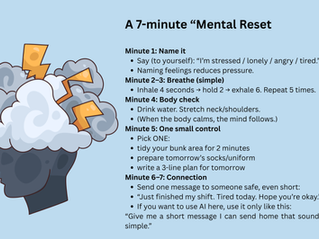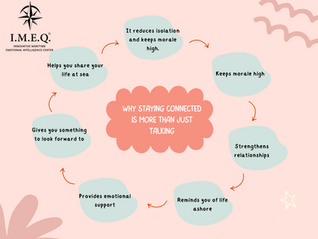Prioritizing Mental Health: Navigating the Challenges Faced by Seafarers during Mental Health Month
- May 22, 2023
- 3 min read
Updated: Sep 12, 2023
As we celebrate Mental Health Month, it is essential to recognize the mental health challenges that seafarers face. Seafaring is a highly demanding and stressful job that involves long hours, isolation, and exposure to a range of environmental factors such as rough seas and extreme weather conditions. The impact of these challenges can lead to mental health issues, including depression, anxiety, and post-traumatic stress disorder (PTSD).
At IMEQ Center, we understand the unique mental health challenges that seafarers face and are committed to providing support and resources to help them maintain optimal mental health. We believe that mental health is just as important as physical health, and it is our goal to ensure that seafarers have access to the mental health resources they need to stay healthy and thrive.
Loneliness
One of the most significant mental health challenges that seafarers face is isolation. Spending long periods away from family and friends can be extremely challenging and can lead to feelings of loneliness and homesickness. To address this, we recommend that seafarers stay connected with loved ones through regular phone calls and video chats. This can help to reduce feelings of isolation and provide much-needed emotional support. As a company it is crucial to provide internet onboard.
Stress
Another significant mental health challenge that seafarers face is the stress of the job. Long hours, unpredictable weather conditions, and high-pressure situations can all lead to stress and anxiety. To address this, we recommend that seafarers practice stress-reducing techniques such as mindfulness meditation, exercise, and deep breathing exercises. These techniques can help to reduce stress and improve overall well-being. Companies may want to provide online meditation applications as a resource to seafarers.
Depression
Depression is also a common mental health issue among seafarers. Spending long periods away from home and dealing with the stress of the job can take a toll on mental health and lead to feelings of sadness and hopelessness. Our team of mental health experts is dedicated to providing personalized and compassionate care to help individuals overcome mental health challenges and live a fulfilling life.
PTSD
Post-traumatic stress disorder (PTSD) is another mental health issue that seafarers may experience. Exposure to traumatic events such as accidents at sea or acts of piracy can lead to PTSD. To address this, we recommend that seafarers seek professional help as soon as possible. Early intervention is critical in the treatment of PTSD, and our team of mental health experts is trained to provide the care and support needed to help individuals overcome this condition.
Practice Gratitude
Practicing gratitude is another powerful tool that can help to improve mental health and overall well-being. When we focus on the things we are grateful for, we shift our attention away from negative thoughts and emotions and instead focus on the positive aspects of our lives. This can help to improve our mood, reduce stress and anxiety, and increase overall happiness. For seafarers, taking time to reflect on the things they are grateful for, such as a safe journey, good weather conditions, or a supportive crew, can help to improve their mental state and reduce feelings of isolation and homesickness.
In conclusion, as we celebrate Mental Health Month, let us all take a moment to recognize the mental health challenges that seafarers face. At IMEQ Center, we are committed to providing comprehensive mental health services and resources to support seafarers in maintaining optimal mental health. Whether through effective stress-reducing techniques, mental health services, or educational resources, we are here to help seafarers overcome mental health challenges and live a fulfilling life. Remember, mental health matters, and we are here to support you every step of the way.





































































































Comments